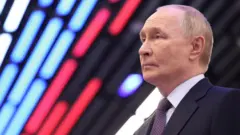Sometimes it's not what's said that makes the biggest impression.
It's the reaction.
In the Russian Far East, Vladimir Putin delivered a warning to the West: don't even think about sending soldiers - and that includes peacekeepers - to Ukraine.
If some troops appear there, the Russian president said, especially now while the fighting's going on, we proceed from the premise that these will be legitimate targets for destruction.
Then the reaction.
The audience at the economic forum in Vladivostok burst into applause, with Russian officials and business leaders apparently welcoming the threat to destroy Western troops. Observing the scene in the hall, I found the applause quite chilling.
This came just a day after Kyiv's allies, the so-called Coalition of the Willing, pledged a post-war reassurance force for Ukraine.
The audience applauded again when the Kremlin leader suggested that he would be prepared to meet Ukraine's President Volodymyr Zelensky - but only on home soil. The best place for this is the Russian capital, in Hero City Moscow, said Putin. Outside Russia, his proposal has been dismissed as unserious, a complete non-starter. A case of political trolling.
But in many ways it encapsulates the Kremlin's current position on the war in Ukraine: Yes, we want peace, but only on our terms. You reject our terms? No peace then. This uncompromising stance is fuelled by a combination of factors.
Firstly, the Kremlin believes that, in Ukraine, Russian forces have the initiative on the battlefield. Secondly, recent diplomatic success in China displayed Putin shaking hands with world leaders, showcasing powerful allies such as China, India and North Korea.
Moreover, American diplomacy under President Trump has added to Russia's confidence. Despite Trump's threats for further sanctions, he hasn't followed through, which bolsters the Kremlin's feeling of security, allowing Putin to praise Trump's peace efforts while rejecting ceasefire proposals with no intention to concede on Ukraine.
Currently, it seems Russia and the West are traveling down distinctly different paths toward peace. While Europe and Ukraine are focused on ending the fighting and establishing security measures, Putin's vision leads him to a potential victory and a beneficial global order for Russia.
As prospects for peace grow dim, the question remains: how will these contrasting pathways converge?
















